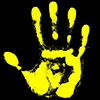What Jonahop said. Start thumbnailing before you start drawing the final thing and guessing along. It will save you time and your sanity.
And when you thumbnail, I mean really do alot to really hammer out ideas and ways to approach them. Don't take it easy and do only 3 or 5. You should be doing 20 to really push your images and find the best idea you can come up with.
Here's a great little article on thumbnailing you should read.
http://muddycolors.blogspot.ca/2012/10/c...nails.html
There are a few obvious ways to make a monster look big in an image, and that's through comparing the monster's size to something the audience can quickly understand. The easiest way is by comparing the monster to an average human. The second you add at least one visible human in the image, we know how big the monster is.
Another, more subjective way that involves the viewer is by having the image simulate being in front of the monster itself. Put us into the action instead of just letting us observe it. If this creature would tower over the average human, we'll be seeing it at a very low angle.
Given your subject I've suddenly got Magic the Gathering on the brain (they're doing Greek mythology right now). I'll post a few cards to show how the artists on the game approach the problem of showing how big a monster is supposed to be. There's more than one way to do it, but you'll notice how common it is to compare the monster to something else to get that sense of scale.
Lar Grant-West's illustration for Stoneshock Giant as well as Daarken's Nessian Demolok are good examples of how you'll reevaluate the size of a creature once you notice how big it is to something else.








![[+] [+]](images/collapse_collapsed.png) Spoiler
Spoiler![[Image: 150.jpg]](https://magiccards.info/scans/en/ths/150.jpg)
![[Image: 214.jpg]](https://magiccards.info/scans/en/ths/214.jpg)
![[Image: 20.jpg]](https://magiccards.info/scans/en/ths/20.jpg)
![[Image: 163.jpg]](https://magiccards.info/scans/en/ths/163.jpg)
![[Image: 198.jpg]](https://magiccards.info/scans/en/ths/198.jpg)
![[Image: 63.jpg]](https://magiccards.info/scans/en/ths/63.jpg)
![[Image: 142.jpg]](https://magiccards.info/scans/en/ths/142.jpg)
![[Image: 104.jpg]](https://magiccards.info/scans/en/bng/104.jpg)
![[Image: 128.jpg]](https://magiccards.info/scans/en/bng/128.jpg)
![[Image: tumblr_mgjoke7yUJ1rv5690o1_1280.jpg]](https://31.media.tumblr.com/e62fbfa813cdd555ba0ad333595c29fc/tumblr_mgjoke7yUJ1rv5690o1_1280.jpg)
